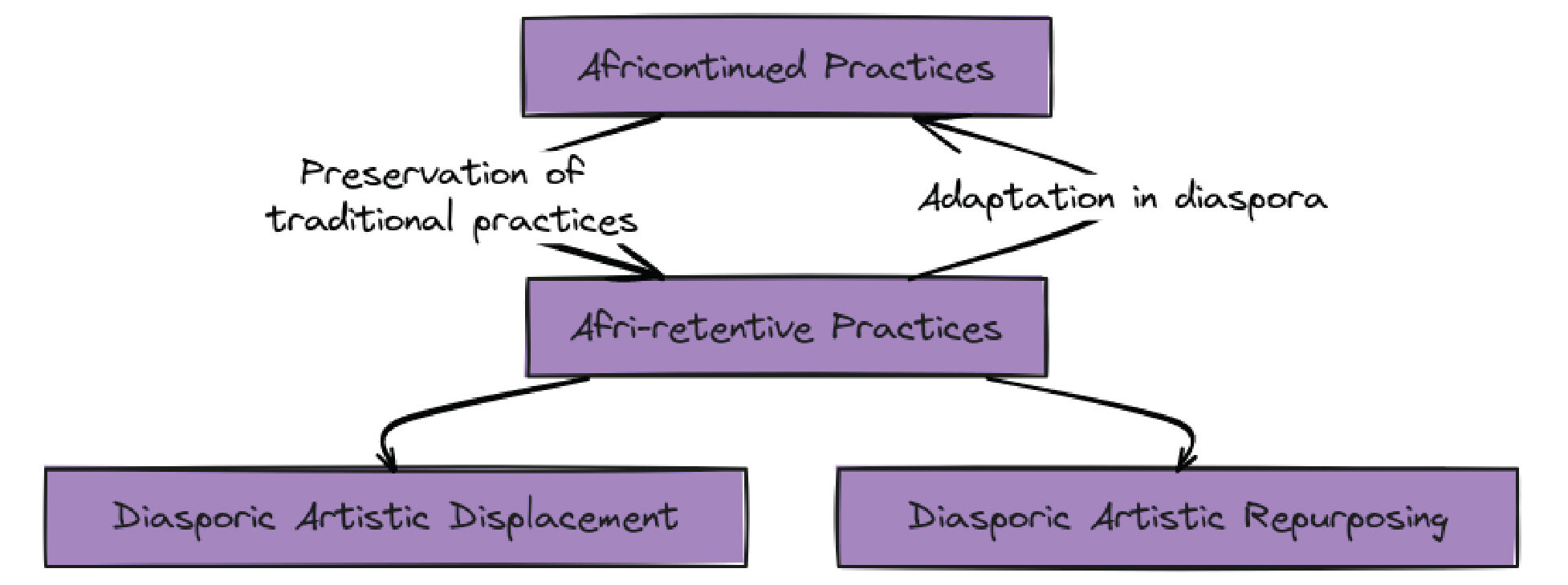In the rich and diverse world of Africana cultures and their journeys through the diaspora, it’s crucial to understand how these cultures balance their deep-rooted traditions with modern artistic expressions. My work has led me to develop two key terms to explore this balance: Africontinued and Afri-retentive practices.

Africontinued Practices (Prestø 2016)
Africontinued practices refer to cultural traditions that have survived within the African diaspora while keeping their original African roots intact. Coined in 2019, this term represents a stance against the erasure of African heritage. By preserving these practices, communities maintain a strong connection to their ancestral history, demonstrating resilience and continuity.
- Historico-cultural Semiotics
- Africontinued expressions resonate deeply with ancestral traditions, maintaining a strong link to their origins. This helps us understand the historical and cultural significance of these practices.
- Corporeal Epistemologies
- Africontinued practices preserve traditional forms and movements that embody the African landscape. These practices maintain the bodily knowledge and movement patterns passed down through generations, keeping the connection to the African continent alive.
- Artistic Syntax
- Africontinued practices focus on preservation and often retain a sacred quality. They emphasize maintaining the original forms and meanings, creating a sense of continuity and sanctity in their artistic expressions.
Afri-retentive Practices (Prestø 2016)
Afri-retentive practices, are traditions that have evolved within the diaspora. These practices are rooted in African aesthetics, philosophies, and practices but have adapted to new circumstances and environments. They combine elements of both the old and the new, reflecting the unique experiences of diasporic communities.
Subcategories of Afri-retentive Practices
- Diasporic Artistic Displacement: This involves changes in traditional African artistic expressions due to new cultural environments. Practices or dances may retain their original names but change significantly due to influences like acculturation and the erosion of cultural memory. This can create confusion and a sense of disconnection from their roots.
- Diasporic Artistic Repurposing: This is the intentional reshaping of African cultural traditions to better reflect the experiences of diasporic communities. It’s not just about adaptation but also reclaiming and reimagining traditions. For example, the African-Caribbean Voudun practice blends ancestral and new deities, showing how traditions can evolve to remain relevant and meaningful.
- Historico-cultural Semiotics
- Afri-retentive forms blend primordial rhythms with diasporic influences, reflecting a synthesis of old and new cultural elements. This helps us understand how these practices convey their historical and cultural significance in a contemporary context.
- Corporeal Epistemologies
- Afri-retentive practices mix ancestral wisdom with new diasporic innovations. This illustrates how the body can become a site of cultural negotiation and transformation, adapting traditional movements to new realities.
- Artistic Syntax
- Afri-retentive practices, whether displaced or repurposed, incorporate new influences, creating a dynamic and multifaceted artistic language. This lexicon reflects the diverse and evolving nature of cultural expressions within the diaspora.
Why Specific Terminology Matters
Using precise terminology helps us avoid the pitfalls of vague and all-encompassing labels that oversimplify the complexity of different dance practices. This nuanced approach allows us to appreciate the intricate variations, cultural origins, and historical trajectories of each dance form.
The terms Africontinued and Afri-retentive practices, along with their subcategories, provide valuable tools to explore the dynamic relationship between ancestral traditions and modern artistic expressions in the African diaspora. By using these frameworks, we can gain a deeper understanding and appreciation of the diverse and evolving nature of Africana cultures.
